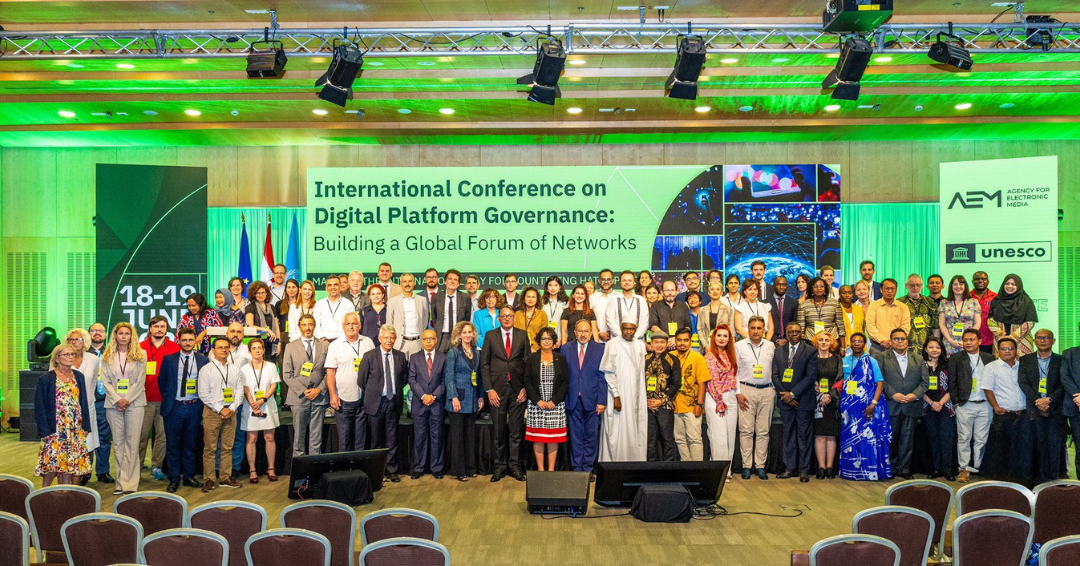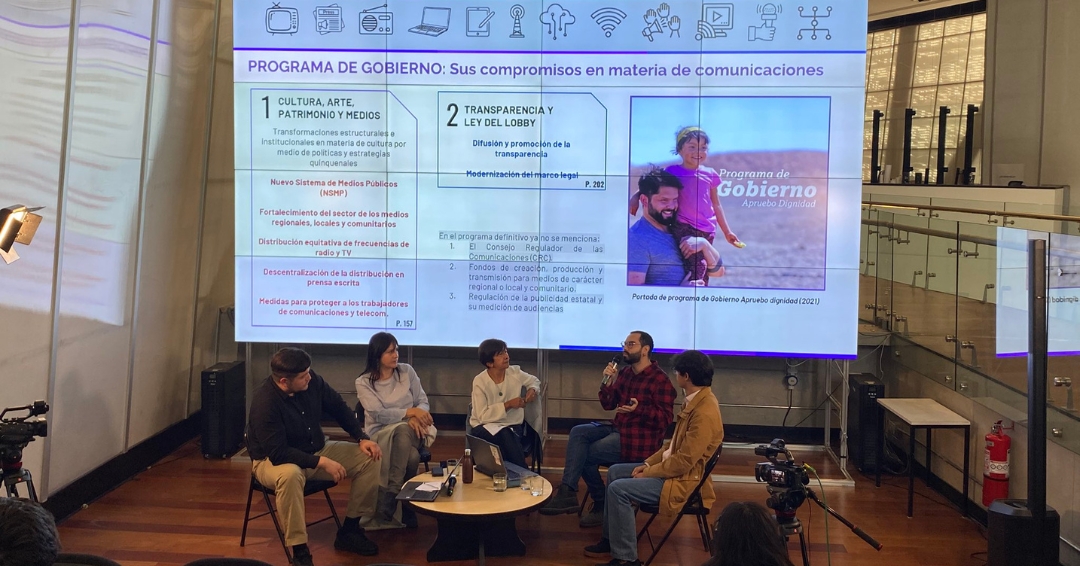- UNESCO and media regulators from across the world created a global network to coordinate the implementation of the Guidelines for the Governance of Digital Platformsduring the International Conference on Digital Platform Governance: Building a Global Forum of Networks, held on June 18th and 19th in Dubrovnik, Croatia.
- • The event gathered representatives from 124 countries, including official representatives from 87 national and regional media regulator networks, as well as digital platforms, governments, electoral management bodies, the civil society and the academia.
- Researchers Chiara Sáez and Patricia Peña participated in the conference and formally joined the I4T Knowledge Network.
“Faced with global platforms, we need global responses. Thanks to the creation of this global network of regulators, hosted by UNESCO and already supported by participants from 124 countries, we will meet the major challenges posed by digital technology at the scale needed. This joint action will be based on one guiding principle: to protect freedom of expression and human rights,” said Audrey Azoulay, Director General of UNESCO.
The conference, attended by researchers Chiara Sáez and Patricia Peña as part of the Fondecyt research on a Convergent Regulatory Institutionalism of Communications, brought together media regulators from around the world in the city of Dubrovnik for a direct dialogue among authorities, companies, think tanks, the academia and the civil society about the challenges posed by major platforms.

Global Network for the Regulation of Digital Platforms
The forum held in June, whose result is the creation of this network of regulators, is a “direct response to the first-ever global Guidelines for the Governance of Digital Platforms released by UNESCO in November 2023, a roadmap for governments, regulatory bodies, digital companies and citizens to define and implement balanced and effective measures”, stated UNESCO.
In this regard, the lead researcher on convergent regulation Chiara Sáez explained:
“What is interesting about this conference, and also in this context, is realizing that there is a demand and will from regulators to leverage or be part of the application of these guidelines in their respective countries. So there is a good synergy between the needs and difficulties that traditional regulators are finding in addressing platform regulation and the guidelines provided by UNESCO.”
Furthermore, the associate professor at the Faculty of Communication and Image (FCEI) of Universidad de Chile pointed out that “another important aspect for us within our participation in this conference was the possibility to formalize our incorporation into the Internet for Trust Knowledge Network, an instance also convened by UNESCO that coordinates think tanks, civil society organizations and the academia as knowledge support for the implementation of the guidelines by regulators”.
Sáez stressed that“we are the only Chilean university in this space , and at a Latin American level, we are one of the few that has a presence, so our participation is relevant to see how, with this, we can open opportunities through various activities and tasks to support regulators in the implementation of these proposed guidelines for platforms that may be subject to regulation”.

To Patricia Peña, FCEI academic and researcher specializing in regulation and digital rights, the conference held in Dubrovnik provided guidance on “how to move toward a vision of what digital platform governance should be, always based on the protection of human rights”.
She added:
“The opportunity to participate as listeners and observers of what occurred in this space based on the research we are conducting in the Fondecyt Project on Convergent Regulation was fundamental to identifying, for example, everything that has to do with the gaps we can observe today in regulatory institutions of media and communications in terms of convergence in the world.”
Peña highlighted that “while these institutions that are more consolidated (in Europe) actively participate, an absence of representatives from countries in Asia and the Middle East, as well as Africa, could be observed”.
Regarding Latin America, Professor Peña explained that “the participation of Latin American representatives was good, but we can also observe the challenges for these institutions if we consider the current competencies they have and what the various dimensions of digital platforms entail, such as issues related to disinformation, regulation of specific digital contents (or not), etc.”.
Main Agreements
To conclude, the results of the conference organized by UNESCO with the support of the Croatian Agency for Electronic Media were:
- Creation of a global network of regulators: This network has the purpose of coordinating the international response to the challenges of digital platforms with a focus on the protection of freedom of expression and human rights.
- Implementation of the Guidelines for the Governance of Digital Platforms published by UNESCO in November 2023: These guidelines are a roadmap for governments, regulatory bodies, digital companies and citizens to define and apply balanced and effective measures.
- Commitment to the Global Forum of Regulators: The participants agreed to co-fund a global forum of regulators that will meet regularly with the civil society to coordinate efforts and improve the governance of digital platforms.
- Focus on disinformation and hate speeches: The event included discussions and parallel events devoted to fighting disinformation and hate speeches, protecting human rights, promoting media literacy and addressing the technical challenges related to digital regulation.
These agreements are a significant step toward international cooperation in the regulation of digital platforms, seeking a balance between freedom of expression and the protection of users in digital environments.



